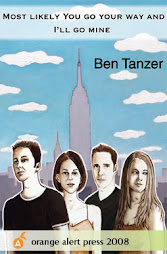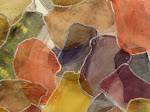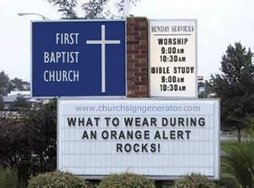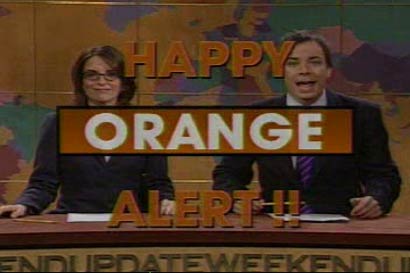
Emperor X
There is a difference between a musician and a performer. True, there are times when the two can manifest in the same person, but I have seen many musicians who are not performers. I didn't fully come to this realization until I saw Emperor X (aka Chad Matheny) perform last May. Chad is an amazing performer, full of energy and excitement, who rallies the crowd to sing and dance as he runs around with his mini guitar and portable amp. He just happens to be a great musician as well.
Chad's first album was released ten years ago, and his style combines aggressive folk music and electronics. At one time a relentless performer, Chad now stays closer to home, but the quality of his music and performances continues to improve. His latest album, The Blythe Archives Volume One, was released by Burnt Toast Vinyl, and as you will find out he has many more projects in the works.
Recently, Chad was kind enough to answer a few of my questions.
Orange Alert (OA): You have built up the reputation of a traveling ministerial of sorts, consistently on tour. What is it about live performances the you enjoy so much? Do you feel that you are slowing down?
Chad Matheny (CM): As flattering as that reputation sounds, I'm sad to say that the notion that I'm constantly on tour isn't accurate. I toured far more in 2004-2006 than I have in 2007 and 2008. As gas prices soared and my financial situation deteriorated after I financed several releases and promotional campaigns on my personal credit, I simply couldn't afford to leave town as much as I used to.
I diligently searched for and landed a job that let me get out of town whenever I wanted within reason; I drastically reduced my living expenses; most of all, I rethought how I was going about the business aspect of being a performer. Nowadays, if I'm on the road for an extended period of time it's usually at the grace of a close friend of mine who's willing to drive and play with me, or of another band who's kind enough to pack me in the van and take me along for a few dates.
These new austerity measures caused a slowdown in the reckless quantity of shows, and forced me to concentrate more both on making money at the shows I did play -- at least enough to pay for the trip and pay myself a living wage -- and, more importantly, on the quality of shows I played. It's much more satisfying to play a well-thought-out five day string of dates at which people can appreciate what I'm doing than it is to play thirty booze bars in a row for $20 a night, sleeping next to a gas refinery at a truck stop and waking up in the van covered in sweat and weird rashes.
In 2007 and 2008 most of my touring has been strictly fiscally responsible -- me, by myself, using public transportation, often on short mini-tours of ridiculous dates that don't pay anything that I deeply want to play, anchored by higher-paying college/university/gallery concerts that I also deeply want to play. My performance equipment nowadays consists of only with what I can carry. It's a dream lifestyle for me, and I feel very lucky to be able to support it by playing music. On the average I'm playing concerts anywhere in North America between six and ten weeks out of a year, and that's what I hope to sustain for the rest of my life. It's less than the marathon pace I was running in 2004-2006, and that's fine with me, because I find myself happier, more productive, more able to absorb each place that I visit, less burned out when I am out playing shows, and less stressed about money when I'm not. My job also frees me from having to think about money as much as I otherwise would, and allows me to do ridiculous things I couldn't otherwise afford.
There's a lot to laud in the dedicated lifestyle of a roving troubadour, and in doses it's certainly something I endorse. For example: a few months ago, after playing music on a whim for two drunk youth pastors at a Huddle House in Sandee, SC, I walked across six miles of forest with all of my gear and played songs and recorded the sound of power poles in a state park and made a music video with paper airplanes. That's the kind of thing I live for. But I don't live up to the mantle of the minstrel. A minstrel does that and nothing else. I'm out there for maybe 25% of my life, and the rest of the time I'm staying in and recording/composing/reading/researching. I'm less of a consistently possessed artist, and more of a dedicated researcher who's been lucky enough to have the knack of turning the possessed artist button on and off at will, for better or for worse.
To answer your question about live performances:
Recording/synthesizing audio material and playing music for a live audience are profoundly different art forms. So many times we see great bands at shows opening up for the act we came to see, unknown bands so great that we're inspired to buy their recording, and when we get home their recorded material disappoints. So many times we've loved an act's recordings and shown up to see them play and left feeling empty because of an uninspired performance. I think most musicians are aware of this, and it's a harsh reality to face, especially for a solo performer like myself touring with a backpack's worth of gear trying to do live justice to recordings that often have 16 tracks or more of overdubs and washes of effects. For me, the fun lies in taking the compositions that underlay the recordings and starting from scratch with the material at hand, re-arranging things, changing keys, deleting or adding whole sections, etc. The performance process done well translates the underlying composition into something fragile and human and temporal and overwhelming in the same way that the recording process done well translates the underlying composition into something massive and physical and eternal and overwhelming. I think a good performance is one that makes this process, and the effort it demands from the individuals involved, clearly visible to the audience.
In more concrete language:
I often think about music before recording technology. I think about Vienna and the stories about how, during the classical era, performance of difficult pieces and improvisation and composition were pursuits of common people, like watching television is for most Westerners today. I think about the fact that many of the great composers were also virtuoso performers and improvisers: Bach, Buxtehude (who Bach walked hundreds of miles to see perform!), Mozart, and Rachmaninoff, just to name the first four that come to mind. If the human being is capable of this kind of greatness, and if in Vienna in the classical era even the common man approached it, then I think I'm doing any audience I may have a disservice if all I do is spend hours and hours splicing together fragments of audio and manipulating them into something I could never even approach doing live, and show up at a concert weighed down by technology and its expectations and cave by playing along to a single audio track. I think that's capitulating to technology, not using it. I think I'm doing my job as a recordist/performer when I think about the underlying nut of each song as the source of what is generated, and follow it as a loose guide in the creation of the performance, neither letting it dominate and playing a failed duplicate of a recording or ignoring it and playing something else entirely. It's hard, and I think an audience can see this effort when it happens, and I think they call it a performer "getting into it." It's something I aspire towards.
There's also this nasty notion that is blamed (unfairly!) on punk rock that insists one doesn't have to be a good musician to play music. That's ludicrous. Punk, and maybe rock in general, expanded our notion of what good musicianship is, and placed a bit more emphasis on style and content and spiritualism and individuality. I think too many artists mistake this freedom as a license to ignore the live domain entirely, or worse, as a license to suck, or worst of all as a license to not practice. For some artists (techno, ambient, etc.) that exists almost entirely in the domain of lush, technological audio, "live" means being played by a DJ at a club or live-composing on a laptop, and that attitude is appropriate and exciting. But for singer/songwriters it's a dereliction of duty.
OA: My favorite part of your performance here in May was the way you got the audience involved. Do you feel like that is an important part your shows?
CM: Audiences are bored. That's nothing new -- watching performances is an inherently boring act most of the time. I think interactivity is one of many ways to snap people out of their yawning and get them to shift their perceptions and join the music for a few minutes. The experience of being absorbed in a musical event is so wonderful that people will put up with hours and hours of boring performances and appreciate what they can in them just for the chance of getting to be there when something powerful like that happens. There are plenty of other more and less subtle techniques for getting people to pay attention and join you in the sounds, but I think there is something special about directly involving a crowd. It's just plain fun to sing along! Why not? It feels anarchic and full of possibility for everyone involved. And, if you want to get highbrow about it, the performer can think about the crowd as an instrument to be played and write parts specifically for them.
There are a LOT of people doing this right now, foremost among them I guess would be Jason Anderson, so I think it just must be in the early 21st century water. Maybe it's a consequence of the Internet and crowdsourcing and blogs and all that -- the notion that we're all [insert specialization here].
That said, I think there are good sing-a-longs and bad ones, so it's not like it's a magic bullet if you're having a bad show. I've tried the crowd participation on a night I was sucking and it bombed, just like everything else.
OA: I was also fascinated by the equipment that you used, the small portable amp and taped up microphone, tape player, etc. Does the equipment player a role in your sound?
CM: The equipment one chooses during recording is responsible for the sound of the finished work. Unless you're improvising, performances aren't the same kind of ground-up act of creative synthesis. People are more forgiving about things like timbre and so forth, so it's probably not as important. I think that it's far more personal. The kinds of objects that a performer feels comfortable with, and knows how to manipulate, are the kinds of objects they should use in performance. For bonus points, the recording and the performance are imbued with a special kind of unity if the same or similar equipment is used for both.
A lot of my thinking goes toward analogue media, electromechanical (as opposed to digital) sound filtering and synthesis, and the power of portability. I think that's reflected in the kinds of equipment I tend to take with me when I play concerts. Almost all the amps I use, for example, are battery powered, partly because I like the idea that if the power went out I'd still be able to play a show. I also like to be self-contained and stay as uninvolved from the house PA as is feasible, for the same reason. This also frees me from awkwardness if I disagree with a well-intentioned sound engineer on some aesthetic issues.
All of the above notwithstanding, I think the most important determining factor of what I choose to perform on is: "Will it fit in my carry-on baggage?"
OA: With all of the tour the must not be a lot of time for recording. Do you enjoy recording? Is there a new album in the works?
CM: I have plenty of time for recording. Way too much, even. I enjoy it so much that I rarely finish anything because I keep moving on and recording new idea after new idea. I'm only traveling at most two or three months out of the year, so there's plenty of time to record. And I tend to bring portable recording gear with me when I tour too, so a lot gets done even when I'm away.
There are several new releases forthcoming. I don't have solid release dates for any of them, but here's a rough outline:
1) The Blythe Archives, Vol. II (late '08 hopefully)
2) Tranvia Geosincrona/Tranvia Lunar (Spanish-language E.P., late '08 or early '09)
3) A split 7" with my friend Ben Horowitz a.k.a. Porches
4) a few comps, on one of which I'll be covering a Twelve Hour Turn song!
5) The Blyteh Archives Vol. III (sometime in the future)
6) The Blythe Archives Vol IV (sometime in the future)
7) whatever comes after the Blythe Archives series
OA: Your most recent album was released by Burnt Toast Vinyl. What was your experience like with BTV? How did you get involved with them?
CM: Scott Hatch runs BTV. He's a great guy, and we've been friends for a little over two years now, at least as much as dudes who live in separate cities and talk a few times a year can be friends. He offered to include me in his nifty series of one-sided LPs after attending a performance in Philadelphia. I've met some cool people through Scott, and he has a lot of great bands on his roster.
(if you look closely you will see me in this video!)
There is a difference between a musician and a performer. True, there are times when the two can manifest in the same person, but I have seen many musicians who are not performers. I didn't fully come to this realization until I saw Emperor X (aka Chad Matheny) perform last May. Chad is an amazing performer, full of energy and excitement, who rallies the crowd to sing and dance as he runs around with his mini guitar and portable amp. He just happens to be a great musician as well.
Chad's first album was released ten years ago, and his style combines aggressive folk music and electronics. At one time a relentless performer, Chad now stays closer to home, but the quality of his music and performances continues to improve. His latest album, The Blythe Archives Volume One, was released by Burnt Toast Vinyl, and as you will find out he has many more projects in the works.
Recently, Chad was kind enough to answer a few of my questions.
Orange Alert (OA): You have built up the reputation of a traveling ministerial of sorts, consistently on tour. What is it about live performances the you enjoy so much? Do you feel that you are slowing down?
Chad Matheny (CM): As flattering as that reputation sounds, I'm sad to say that the notion that I'm constantly on tour isn't accurate. I toured far more in 2004-2006 than I have in 2007 and 2008. As gas prices soared and my financial situation deteriorated after I financed several releases and promotional campaigns on my personal credit, I simply couldn't afford to leave town as much as I used to.
I diligently searched for and landed a job that let me get out of town whenever I wanted within reason; I drastically reduced my living expenses; most of all, I rethought how I was going about the business aspect of being a performer. Nowadays, if I'm on the road for an extended period of time it's usually at the grace of a close friend of mine who's willing to drive and play with me, or of another band who's kind enough to pack me in the van and take me along for a few dates.
These new austerity measures caused a slowdown in the reckless quantity of shows, and forced me to concentrate more both on making money at the shows I did play -- at least enough to pay for the trip and pay myself a living wage -- and, more importantly, on the quality of shows I played. It's much more satisfying to play a well-thought-out five day string of dates at which people can appreciate what I'm doing than it is to play thirty booze bars in a row for $20 a night, sleeping next to a gas refinery at a truck stop and waking up in the van covered in sweat and weird rashes.
In 2007 and 2008 most of my touring has been strictly fiscally responsible -- me, by myself, using public transportation, often on short mini-tours of ridiculous dates that don't pay anything that I deeply want to play, anchored by higher-paying college/university/gallery concerts that I also deeply want to play. My performance equipment nowadays consists of only with what I can carry. It's a dream lifestyle for me, and I feel very lucky to be able to support it by playing music. On the average I'm playing concerts anywhere in North America between six and ten weeks out of a year, and that's what I hope to sustain for the rest of my life. It's less than the marathon pace I was running in 2004-2006, and that's fine with me, because I find myself happier, more productive, more able to absorb each place that I visit, less burned out when I am out playing shows, and less stressed about money when I'm not. My job also frees me from having to think about money as much as I otherwise would, and allows me to do ridiculous things I couldn't otherwise afford.
There's a lot to laud in the dedicated lifestyle of a roving troubadour, and in doses it's certainly something I endorse. For example: a few months ago, after playing music on a whim for two drunk youth pastors at a Huddle House in Sandee, SC, I walked across six miles of forest with all of my gear and played songs and recorded the sound of power poles in a state park and made a music video with paper airplanes. That's the kind of thing I live for. But I don't live up to the mantle of the minstrel. A minstrel does that and nothing else. I'm out there for maybe 25% of my life, and the rest of the time I'm staying in and recording/composing/reading/researching. I'm less of a consistently possessed artist, and more of a dedicated researcher who's been lucky enough to have the knack of turning the possessed artist button on and off at will, for better or for worse.
To answer your question about live performances:
Recording/synthesizing audio material and playing music for a live audience are profoundly different art forms. So many times we see great bands at shows opening up for the act we came to see, unknown bands so great that we're inspired to buy their recording, and when we get home their recorded material disappoints. So many times we've loved an act's recordings and shown up to see them play and left feeling empty because of an uninspired performance. I think most musicians are aware of this, and it's a harsh reality to face, especially for a solo performer like myself touring with a backpack's worth of gear trying to do live justice to recordings that often have 16 tracks or more of overdubs and washes of effects. For me, the fun lies in taking the compositions that underlay the recordings and starting from scratch with the material at hand, re-arranging things, changing keys, deleting or adding whole sections, etc. The performance process done well translates the underlying composition into something fragile and human and temporal and overwhelming in the same way that the recording process done well translates the underlying composition into something massive and physical and eternal and overwhelming. I think a good performance is one that makes this process, and the effort it demands from the individuals involved, clearly visible to the audience.
In more concrete language:
I often think about music before recording technology. I think about Vienna and the stories about how, during the classical era, performance of difficult pieces and improvisation and composition were pursuits of common people, like watching television is for most Westerners today. I think about the fact that many of the great composers were also virtuoso performers and improvisers: Bach, Buxtehude (who Bach walked hundreds of miles to see perform!), Mozart, and Rachmaninoff, just to name the first four that come to mind. If the human being is capable of this kind of greatness, and if in Vienna in the classical era even the common man approached it, then I think I'm doing any audience I may have a disservice if all I do is spend hours and hours splicing together fragments of audio and manipulating them into something I could never even approach doing live, and show up at a concert weighed down by technology and its expectations and cave by playing along to a single audio track. I think that's capitulating to technology, not using it. I think I'm doing my job as a recordist/performer when I think about the underlying nut of each song as the source of what is generated, and follow it as a loose guide in the creation of the performance, neither letting it dominate and playing a failed duplicate of a recording or ignoring it and playing something else entirely. It's hard, and I think an audience can see this effort when it happens, and I think they call it a performer "getting into it." It's something I aspire towards.
There's also this nasty notion that is blamed (unfairly!) on punk rock that insists one doesn't have to be a good musician to play music. That's ludicrous. Punk, and maybe rock in general, expanded our notion of what good musicianship is, and placed a bit more emphasis on style and content and spiritualism and individuality. I think too many artists mistake this freedom as a license to ignore the live domain entirely, or worse, as a license to suck, or worst of all as a license to not practice. For some artists (techno, ambient, etc.) that exists almost entirely in the domain of lush, technological audio, "live" means being played by a DJ at a club or live-composing on a laptop, and that attitude is appropriate and exciting. But for singer/songwriters it's a dereliction of duty.
OA: My favorite part of your performance here in May was the way you got the audience involved. Do you feel like that is an important part your shows?
CM: Audiences are bored. That's nothing new -- watching performances is an inherently boring act most of the time. I think interactivity is one of many ways to snap people out of their yawning and get them to shift their perceptions and join the music for a few minutes. The experience of being absorbed in a musical event is so wonderful that people will put up with hours and hours of boring performances and appreciate what they can in them just for the chance of getting to be there when something powerful like that happens. There are plenty of other more and less subtle techniques for getting people to pay attention and join you in the sounds, but I think there is something special about directly involving a crowd. It's just plain fun to sing along! Why not? It feels anarchic and full of possibility for everyone involved. And, if you want to get highbrow about it, the performer can think about the crowd as an instrument to be played and write parts specifically for them.
There are a LOT of people doing this right now, foremost among them I guess would be Jason Anderson, so I think it just must be in the early 21st century water. Maybe it's a consequence of the Internet and crowdsourcing and blogs and all that -- the notion that we're all [insert specialization here].
That said, I think there are good sing-a-longs and bad ones, so it's not like it's a magic bullet if you're having a bad show. I've tried the crowd participation on a night I was sucking and it bombed, just like everything else.
OA: I was also fascinated by the equipment that you used, the small portable amp and taped up microphone, tape player, etc. Does the equipment player a role in your sound?
CM: The equipment one chooses during recording is responsible for the sound of the finished work. Unless you're improvising, performances aren't the same kind of ground-up act of creative synthesis. People are more forgiving about things like timbre and so forth, so it's probably not as important. I think that it's far more personal. The kinds of objects that a performer feels comfortable with, and knows how to manipulate, are the kinds of objects they should use in performance. For bonus points, the recording and the performance are imbued with a special kind of unity if the same or similar equipment is used for both.
A lot of my thinking goes toward analogue media, electromechanical (as opposed to digital) sound filtering and synthesis, and the power of portability. I think that's reflected in the kinds of equipment I tend to take with me when I play concerts. Almost all the amps I use, for example, are battery powered, partly because I like the idea that if the power went out I'd still be able to play a show. I also like to be self-contained and stay as uninvolved from the house PA as is feasible, for the same reason. This also frees me from awkwardness if I disagree with a well-intentioned sound engineer on some aesthetic issues.
All of the above notwithstanding, I think the most important determining factor of what I choose to perform on is: "Will it fit in my carry-on baggage?"
OA: With all of the tour the must not be a lot of time for recording. Do you enjoy recording? Is there a new album in the works?
CM: I have plenty of time for recording. Way too much, even. I enjoy it so much that I rarely finish anything because I keep moving on and recording new idea after new idea. I'm only traveling at most two or three months out of the year, so there's plenty of time to record. And I tend to bring portable recording gear with me when I tour too, so a lot gets done even when I'm away.
There are several new releases forthcoming. I don't have solid release dates for any of them, but here's a rough outline:
1) The Blythe Archives, Vol. II (late '08 hopefully)
2) Tranvia Geosincrona/Tranvia Lunar (Spanish-language E.P., late '08 or early '09)
3) A split 7" with my friend Ben Horowitz a.k.a. Porches
4) a few comps, on one of which I'll be covering a Twelve Hour Turn song!
5) The Blyteh Archives Vol. III (sometime in the future)
6) The Blythe Archives Vol IV (sometime in the future)
7) whatever comes after the Blythe Archives series
OA: Your most recent album was released by Burnt Toast Vinyl. What was your experience like with BTV? How did you get involved with them?
CM: Scott Hatch runs BTV. He's a great guy, and we've been friends for a little over two years now, at least as much as dudes who live in separate cities and talk a few times a year can be friends. He offered to include me in his nifty series of one-sided LPs after attending a performance in Philadelphia. I've met some cool people through Scott, and he has a lot of great bands on his roster.
(if you look closely you will see me in this video!)
Bonus Questions:
OA: Coffee? You seemed to have a ton of energy is coffee the source? Where have you found the best cup?
CM: I hate coffee! I might drink green tea once or twice a week, if at all. I think the source of energy I have when performing is the insane nervousness I feel.
OA: What was the last great book you have read?
CM: Hmmmmm.../To Have or to Be/ by Erich Fromm, I guess.
For more information on Emperor X please visit his website.
+by+Nick+Volkert).jpg)





















No comments:
Post a Comment